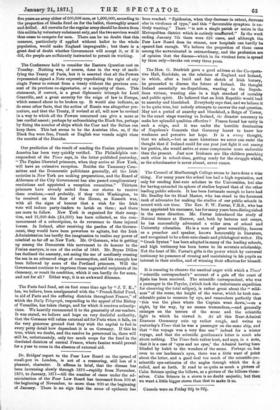It is amusing to observe the nautical anger with which
a Times' "scientific correspondent's" account of a gale off the coast of Spain has been received. The scientific correspondent, who was a passenger in the Psyche, (which took the unfortunate expedition for observing the total eclipse), is rather great about the " wild- ness" of the scene, the height of the waves, which he took con- siderable pains to measure by eye, and remembers perfectly that this was the place where the Captain went down,'—on a night, by the way, by no means tremendous,—and generally enlarges on the terrors of the scene and the scientific light in which he viewed it. At all this Rear-Admiral Erasmus Ommaney cuts up rather rough, and writes to yesterday's Times that he was a passenger on the same ship, and that " the voyage was a very fine one " indeed for a winter voyage, and that the scientific gentleman's letter is much ado about nothing. The Times feels rather hurt, and says, in a note, that it is a case of ' eyes and no eyes,' the Admiral having been blinded by habit to the wonders of the scene. Perhaps so, but even to our landsman's eyes, there was a little want of point about the letter, and a good deal too much of the scientific- scientific eye-estimates of the angles through which the b. .p rolled, and so forth. It read to us quite as much a picture of Calm Science eyeing the billows, as a picture of the billows them- selves. Calm Science in a storm is no doubt majestic, but then we want a little bigger storm than that to make it so.






























 Previous page
Previous page